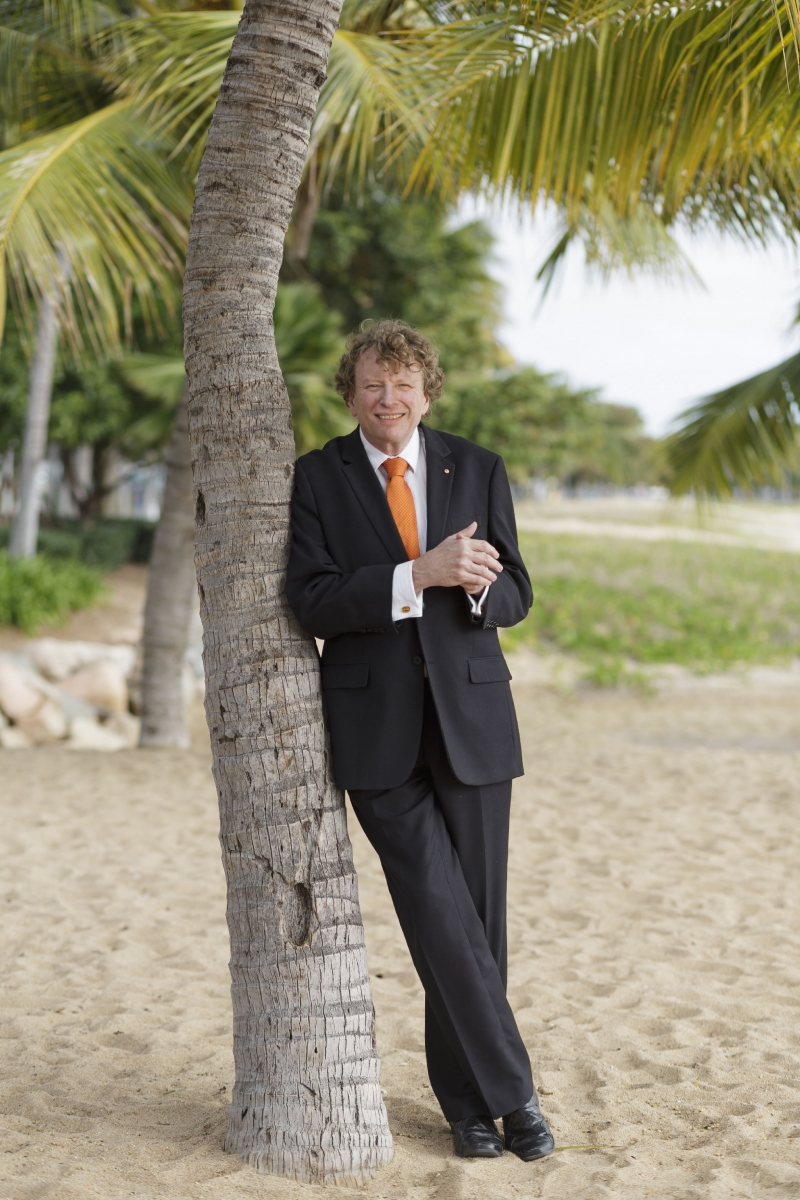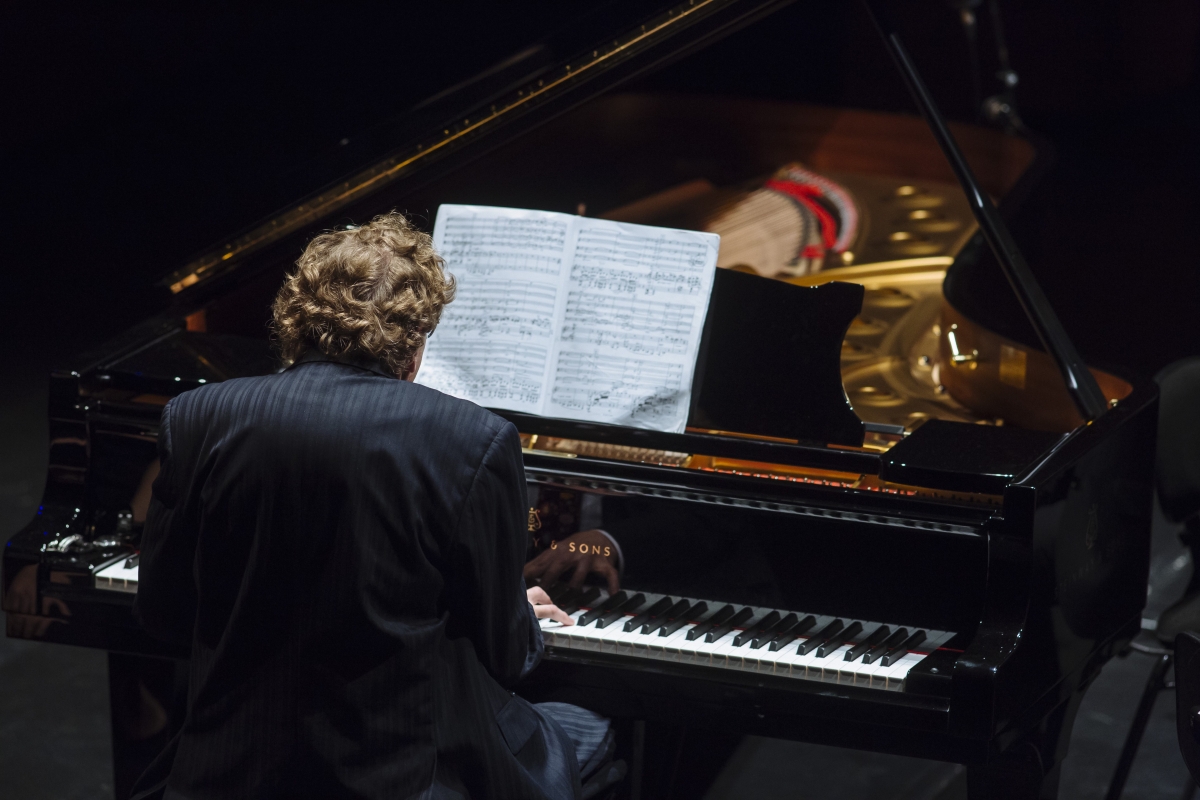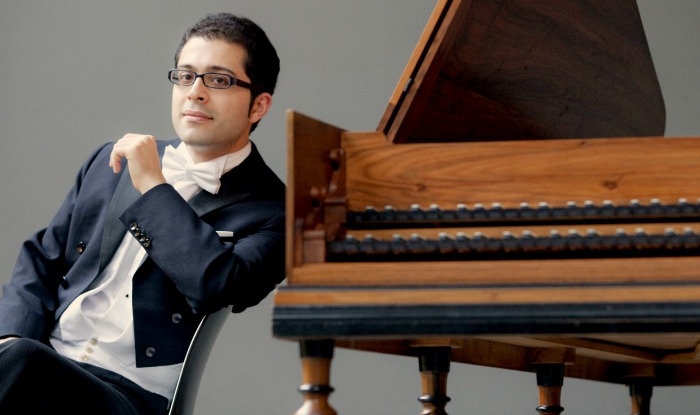The 2017 Australian Festival of Chamber Music will be Piers Lane’s final Festival as Artistic Director before he hands over the reins to Kathryn Stott. The well-loved pianist has been a mainstay of the Festival since he was appointed AD in 2007, but his relationship with Townsville stretches back even further.
“I had been to the Festival three or four times before I started directing,” Lane tells me over the phone from Alaska, where he’s performing in yet another Festival. “I’d been as a player, so I knew basically what to expect. I knew how things went and I knew the buildings that were used at the time.”
Lane soon put his own stamp on the Festival after taking over from the only other AD the Festival has ever had, Theodore Kuchar, tweaking the standard line-up of instrumentation in his first year. “They had had one or two singers doing a tiny bit beforehand,” he says, “but I remember taking four singers the first year, including Peter Coleman-Wright and Cheryl Barker, who are going to be there briefly again this year.” The return of the two singers in 2017 will provide a neat symmetry to his tenure, but it wasn’t just singers that Lane added to his first Festival.
 Piers Lane in Townsville. Photo © Andrew Rankin
Piers Lane in Townsville. Photo © Andrew Rankin
“I increased the number of instruments significantly as well,” he says. “I think they’d often had that number of players, maybe not quite, but I took a full complement of woodwind [which] increased the whole outlook of the Festival immediately.”
Lane was very wary, however, of attempting to fix anything that wasn’t broken, maintaining a similar format to what had been done previously. “There are certain things I’m still doing now which Ted was doing before, like Bach by Candlelight – that was always a very popular event.”
“The biggest thing I did when I started in 2007 was to introduce the Concert Conversations,” Lane explains. “I was thinking about what I could do to bring us closer to the audience members and I hit on the idea of interviewing people. I’d already done quite a bit of interviewing on the BBC. In the first year I themed every morning according to a different country, Italy, France, Australia, England, and the music was by composers from those countries, and so was the food – we had croissants with coffee on the French day. That proved rather expensive to mount, so we changed the details, but not the format of having an interview followed by a concert.”
Eleven years later, the Concert Conversations are still a wildly popular part of the Festival, running nearly every morning across the nine days. “That event proved a hit right from the start and is always a sell-out,” Lane says. “It’s something people talk about. I remember at the time, somebody said they’d heard the Goldner Quartet playing for all those years, but never knew their individual stories and were delighted to find out more about them. That’s what the Concert Conversations were meant to do.”
“That’s an exciting thing, and the thing that makes festivals different from concert series’,” Lane says. “People can get to know artists and be around for several nights and realise that classical musicians are not odd people, really. They get to eat with them and drink with them and chat with them, and the musicians love that interaction.”
Over the course of his tenure, Lane has seen the Festival expand. “It’s grown exponentially,” he says. “We get huge audiences – that didn’t happen to quite the same degree in those days. It’s grown with people returning and spreading the word all the time.”
Have there been any surprises for the pianist in his role as Artistic Director? “I was terribly worried that first year because I put in a major modern work by Harrison Birtwhistle for percussion and piano, with Claire Edwardes and Bernadette Balkus,” he remembers. “It’s a 20-minute long piece and I wondered how it would go down.”
But Lane needn’t have worried. “People loved it,” he says. “They got a standing ovation!”
“It’s fiendishly difficult, but the whole atmosphere, the musician’s concentration – and the music itself – really went over a treat,” he says. “After one or two years I felt I really could programme anything and people would go with me.”

Lane is reluctant to pin down any highlights of his tenure – “there have been so many!” – but when pressed, he describes the first time the Festival staged a children’s opera as one of the most exciting performances of all. “We’d had wonderful family concerts,” he says, “particularly with Steve Price – the local DJ – dressing up in his clown suit. But it was an exceedingly noisy audience.”
“We tried various things and eventually hit on the idea of doing a children’s opera,” he explains. “I was in Texas when I had the idea – and scared everyone in the office with the thought of having to mount an opera! – but we did Noye’s Fludde by Benjamin Britten and had 900 people in the audience for it! It combined professional singers and musicians – Britten was so clever – with local singers, musicians, recorder players and children. Britten directs that all the characters can be multiplied by three. It was such a community experience – I’ve kept up a children’s opera every year since.”
“But musically there have been many, many highlights,” Lane says. “A few things I personally loved performing were Rhapsody in Blue with the Australian Brass Quintet – that was great fun. Many of the Bach concerts have had very special moments. I loved doing the Chausson Concerto for Violin and Piano with Giovanni Guzzo my first year – a great experience. We did the Bach Four Piano Concerto and had four grand pianos onstage – I remember Michael Kieran Harvey playing an A for everybody at the beginning, which made everybody crack up.”
So what’s on the cards for Lane’s final Festival as AD? “Being my last one, people imagine that I’d bring back all my favourite people,” he says. “But I’ve got too many favourite people – and too many other people I wanted to invite – so I have just treated this year as any other year, gone ahead and done a festival.”
“There’s a programme to do with war, which I’m particularly excited about,” he says. “We’re having Jake Heggie’s Pieces of 9/11. It sets accounts by real people of what happened to them on 9/11 and it’s a very moving piece. We’re combining it with a string quartet by Hans Krása. He’s an important composer to remember because of his war time experiences. Iain Grandage’s Black Dogs will be in the middle of that. It sounds a very intense programme, but I’m hoping it’s going to be one that will have people very moved when they come out.”
Lane will also be extending threads he began in earlier programmes. “I’m continuing the Schubert song cycle idea,” he says. “Last year we had Roderick Williams doing the Winterreise with Andrew West from England. This year we’ve got Henk Neven who’s a fabulous Dutch baritone, singing Die Schöne Müllerin with Orli Shaham, both making their debuts at the Festival.”
 Harpischordist Mahan Esfahani will be at the 2017 Australian Festival of Chamber Music
Harpischordist Mahan Esfahani will be at the 2017 Australian Festival of Chamber Music
“I’ve got harpsichordist Mahan Esfahani coming,” Lane continues. “He’s already made a bit of a splash in Australia in recent times at the Brisbane Baroque last year. I’ve invited Genevieve Lacey – she was such a hit a few years ago at the Festival – and she mentioned a great friend of hers from Scandinavia, Poul Høxbro, who plays medieval instruments and percussion and tells stories. So the range of music will stretch from the 12th century through to absolutely brand new pieces.”
One of these new pieces will be by the resident composer in 2017, Matthew Hindson, who is writing a new string quartet for the Goldners to premiere on the opening night of the Festival: “Very excited about that!”
Lane is humble when asked about what achievements he is most proud of over the course of his tenure. “I haven’t thought about that, really,” he says. “One of the main things is that it’s still going, and it’s thriving – that’s something, for a festival to be going for 26, 27 years. It’s there to stay, it’s in the arts calendar for Australia, and increasingly, for the world – and long may it continue to grow and thrive. That would be the nicest legacy for me.”
Lane provides an anecdote to illustrate how much the Australian Festival of Chamber Music has become a part of the fabric of Townsville. “I was picked up by a taxi from the airport,” he says. “The taxi driver said, ‘So you here for the reef, mate?’ And I said, ‘No, not exactly, I’m here for the Chamber Music Festival.’ He said: ‘Oh, that chamber music – you can’t have a posh wedding in Townsville these days without a string quartet!’ It made me realise how important the Festival was to the community.”
The Australian Festival of Chamber Music is in Townsville from July 28 to August 5. Tickets to the 2017 Festival are available to AFCM members from March 29 at 9am. Tickets will be on sale to the public April 20.
Click here to stay updated with Limelight’s full coverage of the Australian Festival of Chamber Music.











Comments
Log in to join the conversation.